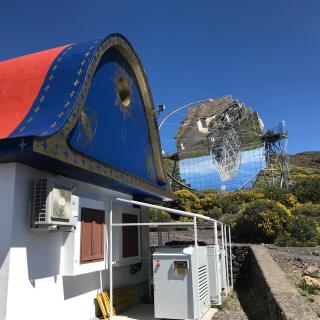It may interest you
-
 Research carried out with the new WEAVE spectrograph, installed on the William Herschel Telescope (WHT) at the Roque de los Muchachos Observatory (La Palma), and in whose construction the Instituto de Astrofísica de Canarias (IAC) has participated, has found a mysterious bar-shaped cloud of iron inside the iconic Ring Nebula. The study was conducted by a European team led by astronomers at University College London (UCL) and Cardiff University, and includes researchers from the IAC. The cloud of iron atoms, described for the first time in Monthly Notices of the Royal Astronomical SocietyAdvertised on
Research carried out with the new WEAVE spectrograph, installed on the William Herschel Telescope (WHT) at the Roque de los Muchachos Observatory (La Palma), and in whose construction the Instituto de Astrofísica de Canarias (IAC) has participated, has found a mysterious bar-shaped cloud of iron inside the iconic Ring Nebula. The study was conducted by a European team led by astronomers at University College London (UCL) and Cardiff University, and includes researchers from the IAC. The cloud of iron atoms, described for the first time in Monthly Notices of the Royal Astronomical SocietyAdvertised on -
 An international team of astronomers has captured the most detailed and completed view yet of the mysterious filaments surrounding the giant galaxy M87. Using new observations from the Gran Telescopio Canarias and the Canada-France-Hawaii Telescope, the study reveals how these long, thread-like structures move, evolve, and interact with their galactic environment and the activity of the central supermassive black hole. These findings have just been published in Monthly Notices of the Royal Astronomical Society. M87: a giant galaxy and its mysterious threads M87, located about 55 millionAdvertised on
An international team of astronomers has captured the most detailed and completed view yet of the mysterious filaments surrounding the giant galaxy M87. Using new observations from the Gran Telescopio Canarias and the Canada-France-Hawaii Telescope, the study reveals how these long, thread-like structures move, evolve, and interact with their galactic environment and the activity of the central supermassive black hole. These findings have just been published in Monthly Notices of the Royal Astronomical Society. M87: a giant galaxy and its mysterious threads M87, located about 55 millionAdvertised on -
 La casa de control de los telescopios MAGIC , en el Observatorio del Roque de los Muchachos (ORM), en La Palma, luce desde hoy una nueva imagen, la del “Enano Estelar”, en homenaje a una de las figuras más queridas de las Fiestas Lustrales de la Bajada de la Virgen de las Nieves . La intervención artística, promovida por la colaboración científica MAGIC, ha sido presentada en un acto institucional que ha reunido a autoridades locales, representantes del mundo científico y medios de comunicación. La transformación del edificio —cuya singular cubierta, obra del arquitecto José Luis PortaAdvertised on
La casa de control de los telescopios MAGIC , en el Observatorio del Roque de los Muchachos (ORM), en La Palma, luce desde hoy una nueva imagen, la del “Enano Estelar”, en homenaje a una de las figuras más queridas de las Fiestas Lustrales de la Bajada de la Virgen de las Nieves . La intervención artística, promovida por la colaboración científica MAGIC, ha sido presentada en un acto institucional que ha reunido a autoridades locales, representantes del mundo científico y medios de comunicación. La transformación del edificio —cuya singular cubierta, obra del arquitecto José Luis PortaAdvertised on
